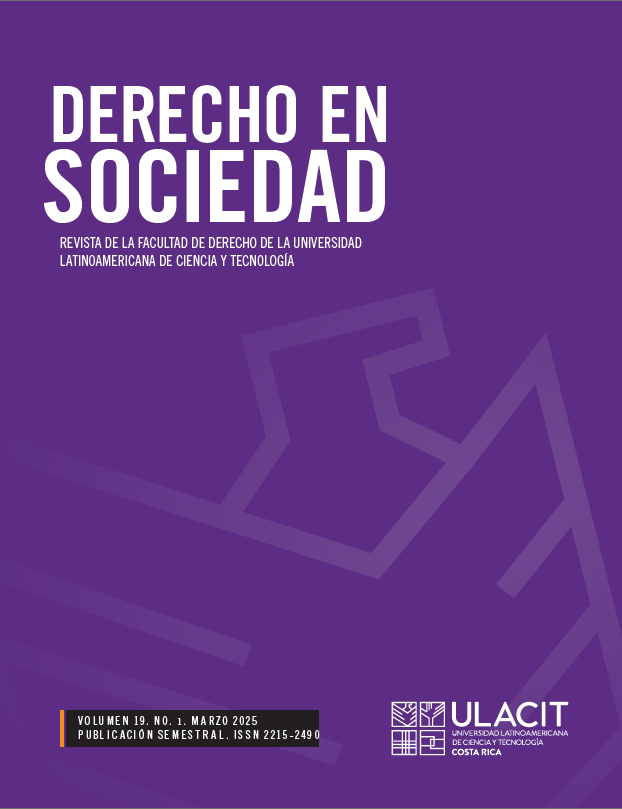
Published 2025-03-31
Keywords
- Latin America,
- alert,
- denounciation ,
- whistleblower protection ,
- human rights
- corruption ,
- whistleblower ...More
How to Cite
Copyright (c) 2025 Derecho en Sociedad

This work is licensed under a Creative Commons Attribution-NonCommercial-ShareAlike 4.0 International License.
Downloads
Altmetrics
Abstract
Latin America is experiencing a democratic recession. In their assessment of the political year 2023
in Latin America, David Recondo and Olivier Dabène mention ‘a rejection vote’, ‘a disaffection
with democracy’ as well as corruption, which is said to have strongly contributed to the distrust of
democratic systems. This is compounded by weak governance capacity and efficiency, high levels
of inequality and systematic violence against social leaders and human rights defenders. In this
civic space, although limited, ‘whistleblowers’, more commonly known as ‘denunciantes’, uncover
corruption scandals, defend the public and the common good. Who are the whistleblowers, what
is the nature of their alerts, how do they act and what are the results of their alerts? Based on
the testimonies of seven Latin American whistleblowers, this article analyses the whistleblowing
process and its price in Latin America.
References
- Alford, C. F. (2002). Whistleblowers: Broken lives and organizational power. Ithaca, NY: Cornell University Press.
- Behrens, A. (2015). The impact of culture on the efficacy and fairness of whistleblowing: A contrast between Brazil and the United States. Thunderbird International Business Review, 57(5), 359–365.
- Cailleba, P. (2019). Quel risque pour le lanceur d’alerte? L’accusation de déloyauté. Institut de Socio-Économie des Entreprises et des Organisations (Écully, Rhône), Recherches en Sciences de Gestion, (132), 235–257.
- Chateauraynaud, F., Gilbert, C., & Torny, D. (2013). Les sombres précurseurs. Paris: EHESS.
- Guelber Fajardo, B. A., & Lopes Cardoso, R. (2014). Does the occasion justify the denunciation?: A multilevel approach for Brazilian accountants. Brazilian Business Review (English Edition), 11(5), 24–48.
- Indice de percepción de la corrupción 2022. Transparency International. Retrieved from https://www.transparency.org/es/press/2022-corruption-perceptions-index-reveals-scant-progress-against-corruption-as-world-becomes-more-violent.
- Jeon, S. H. (2017). Where to report wrongdoings? Exploring the determinants of internal versus external whistleblowing. International Review of Public Administration, 22(2), 153–171.
- Levy, S. (2020, January 14). Xnet claims that the Spanish translation of the European Directive on whistleblowers jeopardizes their protection. Retrieved from https://xnet-x.net/en/xnet-claims-spanish-translation-european-directive-whistleblowers/.
- Lipman, F. D. (2011). Whistleblowers: Incentives, disincentives, and protection strategies. Hoboken, NJ: John Wiley & Sons.
- Nader, R., Petkas, P. J., & Blackwell, K. (1972). Whistle Blowing: The report of the conference on professional responsibility. New York: Grossman Publishers.
- Near, J. P., & Miceli, M. P. (1985). Organizational dissidence: The case of whistle-blowing. Journal of Business Ethics, 4(1), 1–16.
- Observatoire Politique Amérique latine et Caraïbe (OPALC). (2021). Estudio sobre el perfil y la acción de los whistleblowers en América Latina. Documento interno. Recuperado de https://www.sciencespo.fr/opalc/content/alertas-0.html.
- Peters, C., & Branch, T. (1972). Blowing the Whistle: Dissent in the public interest. New York: Praeger.
- Real Academia Española. (2021). Definición de denunciante y denuncia. Retrieved from https://dle.rae.es/denuncianteand https://dle.rae.es/denuncia?m=form.
- Recondo, D., & Dabène, O. (2024). Confrontation sociale, vote de rejet et gouvernements minoritaires. In D. Recondo (Dir.), Amérique latine. L’année politique 2023/Les Études du CERI (n° 271–272). Retrieved from https://www.sciencespo.fr/ceri/fr/papier/etude.
- Sandoval, I. E. (2019). Papel de los informantes internos (whistleblowers) en el combate a la corrupción. In Lo que todos sabemos de la corrupción y algo más (pp. 199–210). México: UNAM (Biblioteca Jurídica Virtual).
- Schehr, S. (2008). L'alerte comme forme de déviance: Les lanceurs d'alerte entre dénonciation et trahison. Déviance et Société, 32(2), 149–162.
- Stolowy, H., Gendron, Y., Moll, J., et al. (2019). Building the legitimacy of whistleblowers: A multi-case discourse analysis. Contemporary Accounting Research, 36(1), 7–49.

